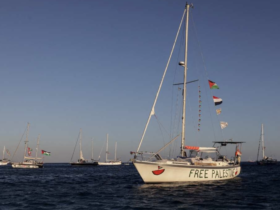ISTANBUL, Sept 30 – Spain prohibited on Monday the transit of US military aircraft and vessels carrying arms, ammunition, or equipment destined for Israel through its bases at Rota (Cadiz) and Moron de la Frontera (Seville), sources familiar with the functioning of the US-Spain Joint Committee confirmed.
“Rota and Moron are not a backdoor,” said the sources, who wanted to stay anonymous, Spanish daily El Pais reported.
The sources stressed that both remain sovereign Spanish bases under Spanish command and that all activity requires Madrid’s authorization.
The move comes as Washington continues to supply the bulk of weaponry used by Israel in its offensive on Gaza, where more than 66,000 people have been killed.
Spanish officials have maintained ambiguity in public statements, insisting that Spain is obliged to respect its bilateral defense agreement with the US, but also clarifying that controversial shipments, such as arms bound for Israel, fall under restrictions.
Although Spain does not inspect US cargo directly, officials argue that concealing such transfers would undermine trust between allies.
They also point out that the sheer volume of weapon deliveries to Israel makes concealment impractical.
One example cited was the delivery earlier this year of six F-35 fighter jets to Israel, which avoided Spanish bases and instead made stopovers in the Azores before crossing the Strait of Gibraltar.
Under the 1988 defense cooperation agreement, amended multiple times, US forces can operate from Spanish bases under specific conditions.
While US aircraft permanently deployed in Spain enjoy freedom of movement, all others must request prior authorization.
Article 25 of the treaty allows quarterly authorizations for logistical support flights but explicitly excludes missions carrying “controversial cargo or passengers” for Spain, which require case-by-case approval.
A 2011 operational procedure further tightened rules, obliging disclosure of flight origins, destinations, and detailed descriptions of mission objectives and cargo.
The restrictions apply equally to naval operations, where port calls must be requested at least five days in advance. While Spain does not inquire about standard weapons onboard due to Cold War-era provisions, nuclear arms remain prohibited under Spanish law since the 1986 NATO referendum.
Earlier this month, the US State Department described as “deeply concerning” nine measures announced by Prime Minister Pedro Sanchez’s government to increase pressure on Israel, including the denial of Spanish airspace to flights transporting defense material to the country.
US officials warned that such restrictions “potentially limit American military operations.”
Despite the complaints, Spanish officials underline that Madrid has the right to deny authorizations for shipments considered politically sensitive.


















Leave a Reply